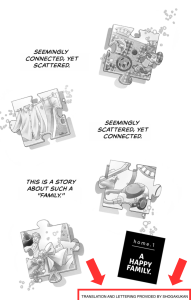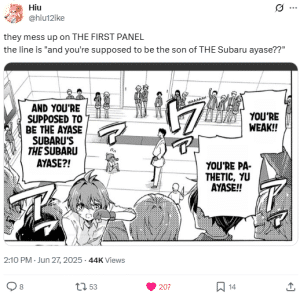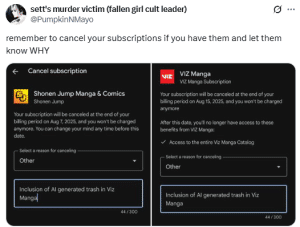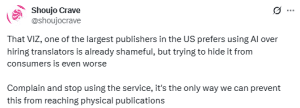Generative AI is everywhere. Everyone wants to be the cool kid, forcing it into every corner of their business to seem innovative. Manga publishers are no exception to this FOMO and are investing big bucks into AI translation. Manga tech startup Orange Inc. (not to be confused with the animation studio Orange) raised ¥2.92 billion (~$19.5 million) in 2024 to enable a capacity for Japanese-to-English “localization” of up to 500 manga volumes per month via its app emaqi. Among its investors? Shogakukan, publisher of the manga magazine Shonen Sunday, recently launched NOVELOUS, a light novel reader app powered by AI translations. Shogakukan is also a co-owner of VIZ Media, which has recently come under fire.
These companies preach their “love for manga,” and yet they fund AI-powered translations under the guise of increasing manga availability and fighting piracy. But that’s bullshit. This is a cost-cutting strategy designed to phase out human translators. At this point, they would automate a handshake if it saved them a dollar.
The Real Issue: Transparency
So, why raise the alarm now? One word: Transparency.
As reported by MangaAlerts on X (formerly Twitter), VIZ Media quietly used the very same AI translation from emaqi for Dealing with Mikadono Sisters Is a Breeze on its VIZ Manga app. That alone is no good, but here’s the curveball. VIZ Media credited the AI-assisted translation and lettering as “provided by Shogakukan.” For shame, VIZ Media. For shame!
 Translation/lettering credits Shogakukan instead of emaqi on the VIZ Manga app. ⒸAYA HIRAKAWA/SHOGAKUKAN
Translation/lettering credits Shogakukan instead of emaqi on the VIZ Manga app. ⒸAYA HIRAKAWA/SHOGAKUKAN Translation/lettering from emaqi. ⒸAYA HIRAKAWA/SHOGAKUKAN
Translation/lettering from emaqi. ⒸAYA HIRAKAWA/SHOGAKUKANNow, I want to be clear: VIZ didn’t produce the AI translation; they licensed it from Shogakukan, who in turn got it from emaqi. So maybe VIZ had its hands tied from a decision coming from above, but who knows? But instead of being honest, they obscured the truth, and that’s what sparked fan outrage. VIZ, did you think your readers would not notice?
Ironically, this mishap revealed their greatest fear: Losing readers. VIZ knows fans would not accept an AI-translated manga if it carried the emaqi label, so they tried to slip it under the radar. That’s not innovation—it’s cowardice.
Cutting Corners, Not Costs
This isn’t just a bad PR move. It’s a bad business one.
Orange Inc. recently secured ¥2.5 billion (~$17 million USD) in loans to expand emaqi. And yet, VIZ Media is covering up their involvement with emaqi. So I beg the question: Why is the biggest manga publisher in North America hiding their connection to emaqi? If they truly believed in this partnership, why not own it?
Because they know readers wouldn’t accept it.
VIZ Media knew fans wouldn’t read the series if they saw the emaqi label, so they bent the truth. Rather than owning the decision, they slipped the release onto their app to shill our pennies. But in doing so, VIZ Media exposed their own lack of confidence in emaqi and, above all, their fear of losing readers.
Rather than investing in quality, VIZ is betting that we’ll pay the same price for a worse product. But fans are already asking: Why pay for an inferior translation when we could just buy the Japanese volume and use Google Translate—or worse, although more common among many readers, pirate it? Seems like VIZ Media didn’t think this through before entering this partnership.
It’s insulting, really. VIZ thinks their readers are stupid enough to not notice or too indifferent to not care about their sneaky ploy. To VIZ Media, I say this: If you are going to add a series translated with AI, then have the integrity to say so. You made this decision—own it. Credit emaqi accordingly. And take the backlash you you deserve up front. This kind of dishonest, cowardly behavior is truly shameful.
VIZ Media’s partnership with emaqi is a disappointing step backward from the solid progress they’ve made. The VIZ Manga app is beyond amazing—potentially one of the best digital manga platforms out there. Sure, VIZ has long faced challenges with the pace of digital manga releases, and translation is one of the most costly and time-consuming parts that slow down output. But cutting corners with AI isn’t the solution. This move feels less like a commitment to readers and more like an attempt to appease shareholders. And that’s exactly the problem. So, VIZ Media, do you know your audience?
VIZ Media seems to have forgotten who their audience truly is. Manga fans are the ones who read legally, buy manga, support artists, and care deeply about translation quality. They are not the ones who would read all manga by any means possible, even if it means pirating it for free against the wishes and well-being of the authors they claim to love. Using AI fails to cater to the latter group and alienates the former. A dangerous tradeoff, if I say so.
Publishers like VIZ risk losing the trust of longtime supporters (and their wallets). The fans who made legal manga a success in the West won’t tolerate this. And if pirate readers haven’t made the jump to legal means, considering the many, oftentimes free options available, AI translations won’t convert them either.
Let’s call this what it is: Greed.
Manga is already an overpriced product in North America, and now it is getting smeared with cheaper, sloppier AI translations? Publishers will tell you that adopting AI is for the sake of greater manga availability and fighting piracy, but that’s just a false display. Instead, they are using AI as an excuse to justify cheaper production costs and poorer quality translations. And if that means undercutting translators and alienating true manga fans, so be it.
The addition of Dealing with Mikadono Sisters Is a Breeze to the VIZ Manga app feels less like a coincidence and more like a calculated move. That is, Shogakukan is testing (or rather, trying to control) the waters. The series, originally from the popular Shonen Sunday magazine, is fairly old, has recently released its new anime adaptation, and yet had never been licensed in any other language—until emaqi “picked it up.” It is suspicious, really.
How did a series with this much potential fly under the radar of every major international publisher? Not even the French licensed it—and they license everything! It’s hard not to assume that Shogakukan deliberately held back the license, saving it as a vehicle to promote and legitimize their investment in Orange Inc. by attaching AI-powered translation to a title fans were waiting eagerly to read.
My concern now is this: Why block licensing the series in all other languages? The most likely explanation is that emaqi isn’t just aiming for English—they’re planning to expand into other languages as well. Not good.
Sure, manga is a business like no other, but incorporating AI-translation should not be seen as anything other than a betrayal of the hardworking and already overworked translators. Greed is disgusting.
Let’s not pretend AI can do this well.
The financial undertaking and human sacrifice it represents must bear fruit to significant results, right? Well, not really. Readers have reported typos, awkward grammar, and poor lettering in the emaqi Mikadono Sisters release. If anything, the emaqi translation is not just inferior to professional translations—it’s worse than fan scanlations and maybe even raw Google Translate.
 Translation errors on The Vermilion Mask on the emaqi app. © Nabana Naba, Dr.Poro, SHONENGAHOSHA
Translation errors on The Vermilion Mask on the emaqi app. © Nabana Naba, Dr.Poro, SHONENGAHOSHA Botched first panel of Dealing with Mikadono Sisters Is a Breeze on the emaqi app. ⒸAYA HIRAKAWA/SHOGAKUKAN. https://x.com/hiu12ike/status/1938676421141963162
Botched first panel of Dealing with Mikadono Sisters Is a Breeze on the emaqi app. ⒸAYA HIRAKAWA/SHOGAKUKAN. https://x.com/hiu12ike/status/1938676421141963162To no one’s surprise, AI-translation sucks. Language isn’t just words. It is complex, beautiful, and has so much nuance that AI could never discern. No AI can ever interpret context and subtext as it is often present in manga. Translation is not a science—it is an art. It is impossible to translate anything 1:1 from Japanese to English—or to any other language really. It requires deep fluency, cultural awareness, empathy, and creative judgment. It requires humans.
Language is at the heart of the manga reading experience. Without it, all the emotion, meaning, and thought that authors pour into their work is lost. As Eisner Award writer and translator Zack Davisson puts it, “translating words as-is—produces unreadable gobbledygook. Even reordering those words into proper English grammar results in uninspired nonsense.” Translators don’t just move words. They recreate meaning. And you can’t automate that.
A thoughtfully crafted story demands an equally thoughtful translation—one that captures meaning, tone, and voice, not just words. When you read a manga, you’re reading the voices of both the author and the translator. The translator is never invisible, even when they try to be. If you haven’t already, I recommend reading Zack’s Confessions of a Manga Translator piece in The Comics Journal, where he breaks down what it truly means to be a translator.
Using AI insults not only readers, but the professionals who’ve built this industry.
Letterers, editors, and translators spend years mastering their craft. They don’t just know Japanese and English. They know characters, cultural nuance, and narrative tone. When a manga dives into niche topics—mahjong, aerospace, medicine—translators research those fields thoroughly to ensure accuracy. That level of care can’t be replaced.
Automating translation not only lowers quality, it devalues their work and livelihood. It’s outsourcing soul.
AI is unable to understand nuance and context. And it is hilarious how they are trying to use AI to translate from Japanese—a high-context language that often packs deep meaning into a few words—to English—a low-context but highly nuanced language. Make it make sense! AI doesn’t know how to bridge that gap. It misunderstands jokes, misinterprets subtext, and mangles dialogue.
Using AI in translation is a recipe for disaster. Conclusion? Use human translators, goddammit! And give them the proper tools and conditions, too.
Manga fans: Now is the time to act. We can’t let this slide.
If VIZ Media gets away with this, it won’t stop at digital. Physical releases could be next. And once the biggest publisher does it, the rest will follow. This is a turning point. AI does not belong anywhere near manga publishers that so claim to love manga. And so, I ask you to please raise your voice.
So what can you do? I encourage you to complain to Viz about using AI-translated/lettered manga, no matter the degree of AI involvement in the final product. It’s cheap, it’s exploitative, and if you’re gonna pay a subscription, you should have products handled by people who care.
How? I recommend:
- Contacting VIZ via their official form
- Speaking out on social media and tagging their accounts
Other fans have also gone as far as cancelling their subscriptions, uninstalling the VIZ Manga app, refraining from purchasing manga distributed by VIZ Media, and backing out of preorders. Readers are making one thing very clear: We do not want AI to translate our manga.
 https://x.com/PumpkinNMayo/status/1950327882104119446
https://x.com/PumpkinNMayo/status/1950327882104119446 https://x.com/shoujocrave/status/1950957882192564426
https://x.com/shoujocrave/status/1950957882192564426 https://x.com/Br0meliaceae/status/1950362690196582668
https://x.com/Br0meliaceae/status/1950362690196582668 https://x.com/MarnieMarwel/status/1950345382250111102
https://x.com/MarnieMarwel/status/1950345382250111102And honestly, it’s okay to be outraged. I am too. But remember, there are still human employees at VIZ Media—editors, letterers, and translators—who aren’t responsible for these decisions. So when speaking out, be firm and direct, but also respectful. Be loud, but not cruel. The more voices, the merrier!
Manga publishers are nothing without readers (and our wallets). Manga authors are nothing without readers too. And readers? To no one’s surprise, we can’t enjoy manga without proper translations. Translators are the key to unlocking the stories we love. They are non-negotiables, not optional. They should be treasured, not replaced.
At the end of the day, manga is just another entertainment product. We, the readers, can live without it. But manga publishers can’t survive without us. Money speaks big time. So if they won’t listen to our words, they will hear our wallets. If you care about the art, the authors, and the future of manga, don’t support services that treat translation like a disposable task.
At the very least, VIZ, be transparent. Not disclosing AI involvement is incredibly deceptive. Readers have a right to know who (or what) is behind the work they’re buying. Hiding it discredits real professionals and misleads your audience.
I’d love to be smug and say “no backsies,” to sit back, and watch VIZ Media crash and burn under the weight of their own decisions. But the truth is, I do love manga after all. I want this industry to thrive. That’s why I genuinely hope VIZ and all other publishers take this backlash seriously and listen to their readers. You claim to love manga just as much as we do. So prove it! Recognize that AI-generated translations are not the future fans want.
Now is the time to reverse your decisions, to walk back the investment in AI and reflect on what made manga special in the first place: The people! If you truly want to make translations faster and more accessible, do it with human translators—not instead of them.
Using AI to “combat” piracy or improve access is not a solution. It’s an excuse. Now, more than ever, North American manga publishers have the resources and talent. What’s missing is the will to invest in those who bring these stories to life. Pay them fair wages. Give them the time and conditions they need to produce quality translations. That’s how you build a future worth supporting.
For simplicity’s sake, I’ve referred to emaqi’s work as “AI-translated.” Technically, Orange Inc. calls it “AI-assisted technologies for manga translation and localization.” They claim “no more than 10 percent” of the localization process is AI-assisted, which helps them “increase localization capacity by 10 or 100 times” from the current state with their small team of approximately 20 human translators. They also claim human oversight remains critical, yet they haven’t disclosed the true extent of AI involvement and what role it plays in the translation process. All of their “clarifications” have been incredibly vague, leading to more ambiguity than clarity.
Without transparency, those claims mean nothing.
Until we know exactly how AI is being used, how much it contributes, and who is responsible for what, skepticism is warranted. I have too much respect for real translators, editors, and letterers to recommend this service or any manga that uses it.
Read it at your own conscience.

 3 hours ago
1
3 hours ago
1

 English (US)
English (US)